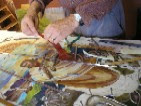


This process continues on both sides of the assembled glass. In the kiln, more painted glass for the remaining two windows is being fired, with each kiln-load taking 6-8 hours to fire and cool. Alternating between windows and processes keeps the glassworker busy at all times.






















